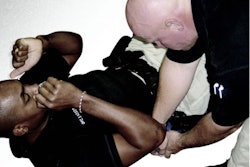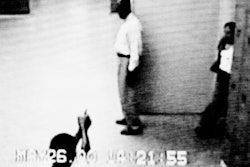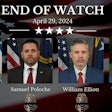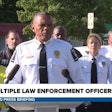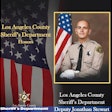At the sight of the silver patrol car with the bumble bee stripe, the children came running. They came running not with the usual curiosity of kids asking for perfunctory activations of lights and siren, but to tell Officer Todd Kobitz of the Valparaiso (Ind.) Police Department about the man who had harassed them.
The children told Kobitz that a drunken man had chased them around the grounds of Jefferson Middle School then retreated into a nearby house with another child. No one was hurt, but the kids were scared, threats had been made, and the report that a small child might be in the care of such an individual could not be ignored. Kobitz headed toward the man’s house.
Kobitz had worked for the Valparaiso Police Department for a year-and-a-half. He took pride in his initiative and in keeping a finger on the pulse of the community. He also took full advantage of his agency’s monthly firearms qualification opportunities.
Every few months the department offered a new qualification course. One trimester consisted of combat shooting; another, night shoots. Kobitz proved to be a good shot in each simulated condition, but his proficiency with the Glock 9mm had not been field tested. Like most cops, Officer Kobitz had made precautionary draws on felony stops, but had never come close to getting into a shooting. It would be fine by him if he could get through his law enforcement career without shooting at anybody or having anybody shoot at him.
Unfortunately, that wasn’t to be.
Here We Go
On the morning of July 15, 2002, after receiving information that a drunken man had harassed and threatened children, Kobitz parked his patrol car at the school and made the short walk to the man’s house. Making his way up an unpaved driveway leading to the house, he was idly aware of the gravel being scrunched beneath his boots. Things were otherwise quiet.
But as Kobitz drew near the front door, he shined his Maglite inside and saw the silhouette of a male standing just inside. Suddenly a voice yelled out, “Come on motherf____s!”
Oh, boy…here we go, thought Kobitz. That explains the absence of a welcome mat.
Kobitz halted and found himself standing abreast the rear bumper of a car parked in the driveway. Hoping to lessen the unseen man’s anxieties, Kobitz identified himself as an officer, said that he only wanted to talk, and illuminated himself with the flashlight. Consciously working to ensure that the man’s angry tone didn’t dictate his own, Kobitz asked the drunken subject to come outside and talk with him.
But Thomas Martz Jr. apparently wanted to do more than just talk. These had been bad days for Martz. A bitter divorce, an ongoing custody dispute, and the impending disconnection of his utilities had taken their toll on the 6-foot, 1-inch, 200-pound Martz, and an afternoon of drinking had done little to enhance his mood. Now a uniformed authority figure stood in his front yard.
Martz barreled through the front door, rapidly closing the 10 yards separating himself from Kobitz. He had a death grip on a .22-caliber rifle.
“I’m going to kill you, motherf____r!” Martz screamed, as he leveled the weapon at Kobitz’s face.
Kobitz drew his service weapon, darted toward the cover of a parked car, and opened fire. Five rounds spat from Kobitz’s Glock. A bullet tore into Martz’s left cheek and another buried itself in his left upper chest. He pitched forward and collapsed face down a mere six feet from Kobitz.
What Happened?
A moment later, the front door opened again. Out stepped a bewildered child, the object of Kobitz’s intended welfare check.
“What happened?” the boy asked.
Kobitz asked himself the same question. From the time that Martz had charged out the door to the moment the last round was fired, everything blurred. Kobitz’s conditioning and training had kicked in on a level he hadn’t anticipated.
In a similar manner, his mind had protected itself, as well. A kind of disassociation had taken place, wherein he was almost outside himself. Now, it all came back together. Mentally and visually, things came back into focus.
He mulled over the chain of events: a lightweight disturbance call…a short drive followed by a shorter walk…a bid to check the welfare of a small child…and now a man lay dying at his feet.
Kobitz stared at the man’s body and at the boy at the door. How could he tell the child that he’d just shot his father? Covering Martz with his Glock, he told the boy to go back inside the house and stay there.
Keying his radio, Kobitz requested EMS personnel and advised that he’d just been involved in a shooting. When other officers arrived on the scene, he re-holstered his gun and removed the firearm from the suspect. He looked at his watch. Only two minutes had passed since he first arrived at the school.
As soon as other officers were on the scene and he felt it was safe for him to do so, Kobitz cleared Martz’s rifle. He checked the port. Empty. The gun had not been loaded.
Kobitz was immediately angry. Why did this have to happen? What was Martz thinking? How the hell could Kobitz have known the rifle was empty? Aside from Martz’s actions as described by the kids, Kobitz didn’t know anything about the man’s history, his trials, his personal demons. In the absence of x-ray vision and telepathy, training and instincts had taken over. He hoped that any reasonable person could see that.
After walking a detective through the crime scene, Kobitz returned briefly to his station before heading to a Porter County Sheriff’s station. The sheriff’s office would handle the officer-involved shooting investigation.
Restless Nights
Kobitz was immediately placed on two weeks’ leave. He says the time off helped him cope with the aftermath of the shooting. In the meantime, a coroner’s report determined that Martz possessed a blood alcohol level of .13 and that either of the two rounds fired by Kobitz which struck the suspect would have proven fatal.
But the shooting troubled Kobitz. Even if the gun had been loaded, the fact that he’d taken the life of a father in front of his son would have torn at him. After all, Kobitz’s own son was about the same age.
A week after the shooting, the phone rang. His digital clock indicated 2:00 a.m. He picked up. A male voice on the other end said, “You snuffed out his life.”
Kobitz hung up the phone.
More late night calls followed. Each time Kobitz picked up, all he could hear was a deafening silence.
Thus began a series of interrupted nights’ sleep. Some nights were fine but, on other nights, Kobitz would find his slumber a long time coming. When it did come, it would be accompanied by intermittent dreams, nightmares wherein the shooting replayed itself time after time.
The Family
On his first day back at work, Kobitz had just finished lunch with a fellow officer when a man approached him outside a restaurant.
“Hello, I’m Thomas Martz Sr.”
Kobitz felt himself go white as the man extended his hand. “I just want you to know that I don’t hold anything against you. I know that you did what you had to do. I will not be filing any kind of legal action against you. It’s over.”
Kobitz appreciated Martz’s words.
But it wasn’t over.
Local news coverage on the shooting was split. One newspaper made an objective appraisal of the situation and acknowledged the tragedy for all involved.
The editors of another local paper believed that the shooting could have been mitigated. Fortunately, the vast majority of letters written to that same paper were supportive of Kobitz’s actions.
Kobitz appeared to have won in the court of public opinion, but other battles loomed.
Investigators from the Porter County Sheriff’s Office submitted their findings to the prosecutor’s office for review. The shooting was deemed justifiable.
Despite the good news, upon his return to work Kobitz was somewhat tentative in handling situations. After a while though, he felt like himself again. Eventually, even the phone calls dissipated and the dreams ceased.
Kobitz renewed his duties with energy and continued to exercise. He felt mentally and physically reinvigorated. He was putting the shooting behind him.
Legal Complications
But it still wasn’t over.
Six months after the shooting, Kobitz was working out at a gym when he spotted a discarded newspaper: The headline froze him in his tracks. A lawsuit was being filed against Kobitz and the city on behalf of Thomas Martz Jr.’s wards. A call from a city attorney appointed to represent him confirmed the news, and Kobitz once again found himself poring over police reports, re-immersing himself in the tragedy. The dreams that had retreated from his consciousness now returned with a vengeance.
Kobitz had his fair share of supporters, ironically, strangers who had nothing to gain by telling the truth. One of Martz’s neighbors gave a deposition testifying on Kobitz’s behalf, describing Martz’s death charge with rifle elevated.
While giving his deposition, Kobitz was challenged by the lawyer representing the Martz estate. “Isn’t it true that you could have handled this differently? That you could have done something different?”
Kobitz looked the lawyer in the eye. “What? Like get shot?” he replied.
The lawyer had no further questions.
Kobitz had not anticipated the collateral effects of his involvement in a shooting. Despite their usual affinity for cops, loan institutions saw him as a liability. It was bad enough being sued, but the lawsuit even hampered his ability to purchase a new house.
After a year passed, Kobitz was finally summoned to his attorney’s office. After reviewing all of the documents and reports pertaining to the shooting, the judge awarded a summary judgment on his behalf.
Hate Mail
Kobitz’s sense of relief was profound. But the trial and concurrent aggravations had left their mark.
On the first anniversary of the shooting, Kobitz received a letter. Noting the absence of a return address, he cautiously tore open the envelope. Atop the enclosed letter were a series of crimson splatters; below were the words, “Remember me.” Kobitz’s anonymous tormentor had thoughtfully included a picture of Thomas Martz Jr., as well as a copy of the man’s obituary.
Kobitz didn’t need to be reminded. He was reflective enough to recognize that a life had been taken without having to have his nose rubbed in it. The obituary only added salt to the still open wound. What little he’d come to know of Martz only gave him a strange sense of pity for the man.
What went through Martz’s mind when he saw Officer Kobitz approach his house is open to speculation. Whether or not Thomas Martz knew his rifle was empty is unknown.
But the history of Thomas Martz Jr. has been written.
Kobitz talks with other officers about the shooting and its aftermath. He lets them know that similar tragedies will likely happen again, that some men will inevitably set things in motion to some desired end, often theirs. But not everyone is so enamored of his desire to share the misfortune of his predicament with others. Kobitz noted that another anniversary has just passed and, once again, not without notice.
While picking up his July 28 paycheck, he found a letter, dated July 15. The letter was from Martz’s sister, composed apparently at the behest of her counselor. Over the span of four pages, she laid out her reasons for resenting him. She characterized as “selfish” a local newspaper article which discussed the shooting.
Kobitz does not welcome the repeated correspondences, but has been told by the local district attorney’s office that the letters don’t amount to anything prosecutable.
Some good has come of the shooting. Kobitz received his department’s Medal of Merit. Parents of the kids who’d been threatened by Martz in the minutes leading up to the shooting wrote supportive letters, telling him how much more they and their children appreciate what an officer’s responsibilities entail. Finally, Kobitz has come to terms with the shooting. He wishes Martz’s family members would do likewise.
Kobitz is most thankful for the support he received from his fellow officers. To other officers who might one day find themselves in similar predicaments, he offers these words:
“You will probably be sued. You will be hated by the relatives of the individual you have shot. The media cannot be counted upon to be compassionate or objective. But if the shooting was justified, you will be exonerated. And don’t underestimate the importance of offering, or receiving, words of encouragement. It’s more helpful than you might think.”
In the meantime, he continues to approach his job with dedication and resolve. He takes a few more seconds in approaching situations, anticipating how things can go south in even seemingly safe contacts.
Dean Scoville is a patrol supervisor with the Los Angeles County Sheriff’s Department and a contributing editor to Police.
Shots Fired: Valparaiso, Indiana 07/15/2002
At the sight of the silver patrol car with the bumble bee stripe, the children came running. They came running not with the usual curiosity of kids asking for perfunctory activations of lights and siren, but to tell Officer Todd Kobitz of the Valparaiso (Ind.) Police Department about the man who had harassed them.







